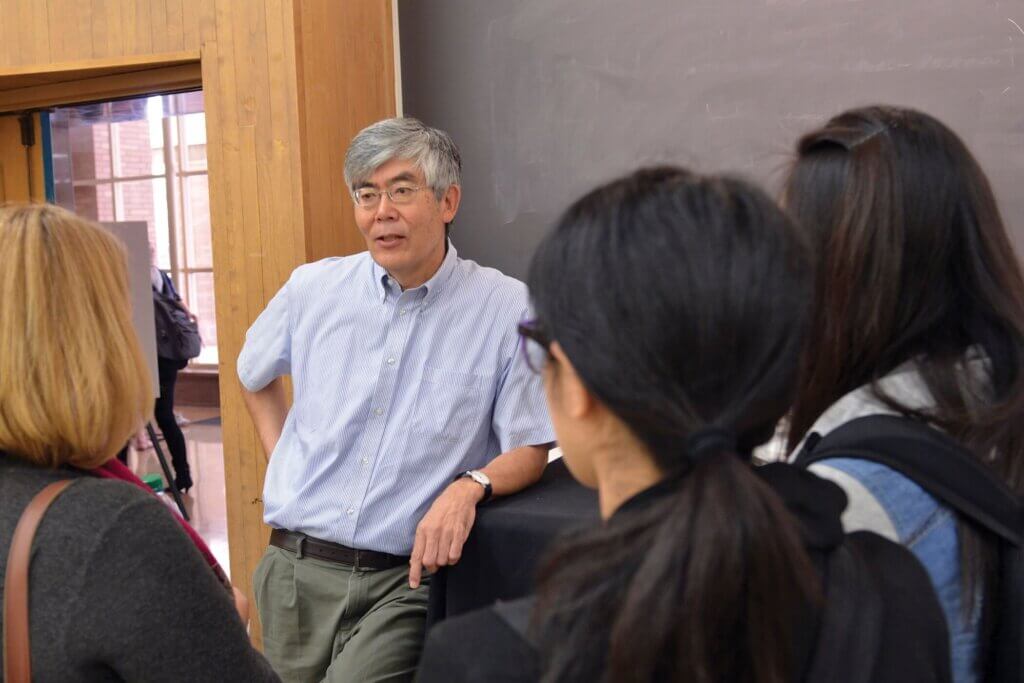Hiroshi Motomura, the Susan Westerberg Prager Distinguished Professor of Law, is a leading authoritiy on immigration and citizenship, a scholar known for applying a strategic, humane approach to addressing the frought political and social shifts that often drive immigration law and policy. In 2020, he was named the inaugural faculty director of UCLA Law’s new Center for Immigration Law and Policy. Here, he shares his vision for making an impact in the years ahead.
The center was established this year, as concerns over U.S. immigration policy starkly illustrate the nation’s deep polarization. What are the key challenges we face, and how can the center respond and influence immigration policy?
A big part of the answer is contained in this question. A key challenge is deep polarization, combined with the visibility of immigration, which can make that polarization worse. Some politicians, including the current U.S. president, have scored points by taking extreme positions that distract from the common ground that could exist. In this policy climate, each side doubles down on familiar positions, such as “build the wall” or “abolish ICE,” when the path forward requires much more nuance and compromise. The Center can play a unique role in road-mapping a way out of the current morass, advancing fresh ideas that reflect the most sophisticated thinking on migration, but which also can crystallize in concrete, feasible and sustainable proposals. For example, “Abolish ICE” includes plans that can smartly reduce pointless detention, provide more due process for noncitizens whose right to stay in the United States is uncertain, and temper enforcement with recognition of the contribution that a noncitizen has made to the United States.
Why is it important to fashion an environment that shifts more of the work in setting immigration policy from the federal government to states, cities and other localities?
The Civil War stands out as an obvious sign of tragic division, but it also led to the idea of a national citizenship that could be a vehicle for full membership and justice for all. But the paths to this national citizenship often pass through local communities. State and local governments can be laboratories to help shape what it means to be an American. For example, immigrants have been the key to revitalizing cities, towns and rural areas that have suffered population loss. Why not give states and localities a voice in admitting immigrants to meet local and regional needs? The center can generate proposals that are sensitive to local and regional needs while also respecting what the U.S. Constitution says about the allocation of legal authority over immigration and immigrants. UCLA’s location in Los Angeles and California, regions with high immigrant populations, offers us both perspective and leverage.
When you consider the development of the DACA program, does its success – including key work by people at UCLA and the U.S. Supreme Court case that the University of California won in June – offer the center a strong model for its work?
The Deferred Action for Childhood Arrivals (DACA) program announced by President Obama in 2012 is one of the great successes of U.S. immigration policy in modern times. It has let close to a million young people contribute their talents to U.S. society in ways that will yield benefits for generations to come. DACA rose from the courage and imagination of young activists who looked beyond legislative failures in Congress. But DACA also reflected the power of ideas, including work by academics and activists at UCLA, to call attention to the role of vast enforcement discretion in the immigration system, and the need to make sure this discretion was exercised in accord with the rule of law. DACA translated those ideas into action, showing that it is possible to bridge the gap between ideas and action. But DACA also shows how precarious this journey can be. For every set of ideas that turns into something as significant as DACA, other ideas languish for lack of a concrete connection to feasible policy. The center’s core mission will be to make sure that these ideas find traction and make a difference.
How has COVID-19 impacted immigration, and what can be done to address those issues?
COVID has exposed many of the inequities in society that had been papered over for generations. This is true in so many arenas, from racial justice to health care to fiscal policy — and to immigration policy. The term “essential workers” has become firmly rooted in our everyday conversation, to refer to workers who make sure that food comes from farm to grocery store to table. These essential workers are often undocumented, or the children of the undocumented — people for whom our immigration system provides very little legal path to admission or citizenship. Our public health crisis has unmasked the hypocrisy of essential workers who have no papers and are left precarious and vulnerable. Here, too, durable solutions require nuance. Offering lawful status to essential workers is a start, but legalization alone is not enough. The path forward also requires measures to make sure that these workers are fully able to contribute to U.S. society. The path also requires assurances that the fruits of immigrant labor help not only their employers, but all workers, including U.S. citizens. Here, too, what’s needed are creative ideas in feasible proposals that can led to durable solutions.
